Religion in WWI Lesson 1
Chris Knepp
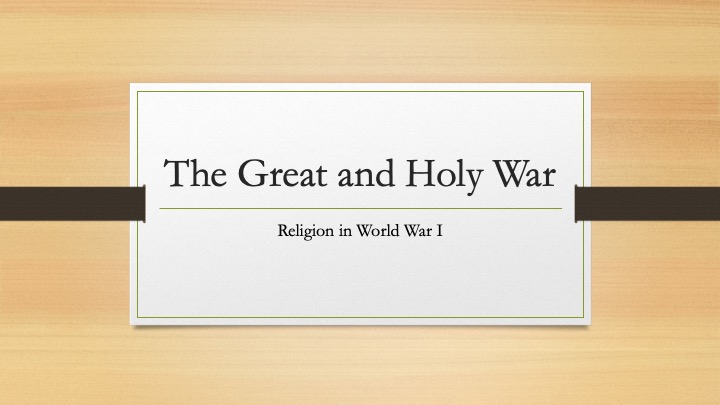
The Great and Holy War
Religion in WWI
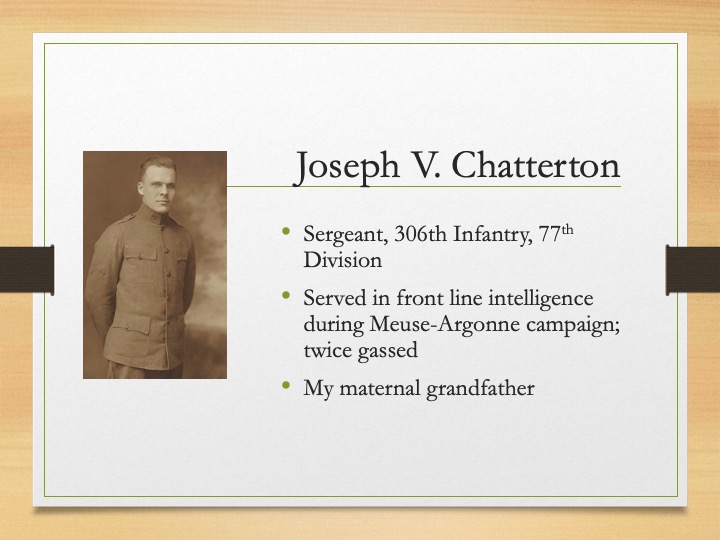
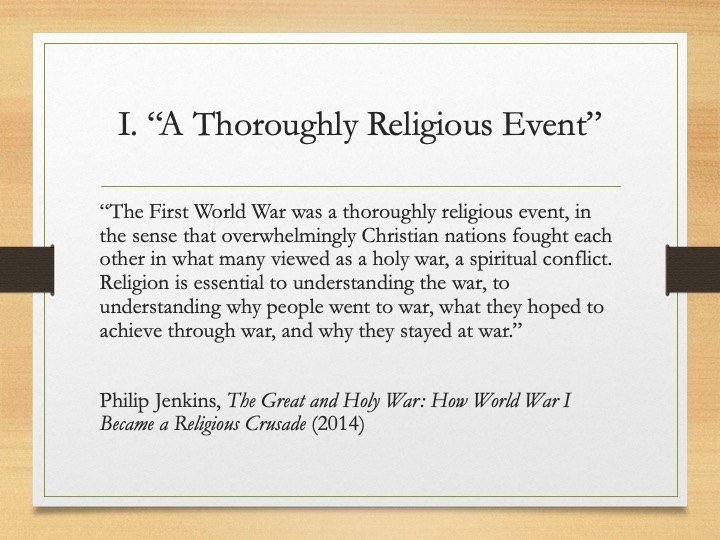
I. WWI “A Thoroughly Religious Event”
“The First World War (WWI) was a thoroughly religious event, in the sense that overwhelmingly Christian nations fought each other in what many viewed as a holy war, a spiritual conflict. Religion is essential to understanding the war, to understanding why people went to war, what they hoped to achieve through war, and why they stayed at war.”
Philip Jenkins, The Great and Holy War: How World War I Became a Religious Crusade (2014)
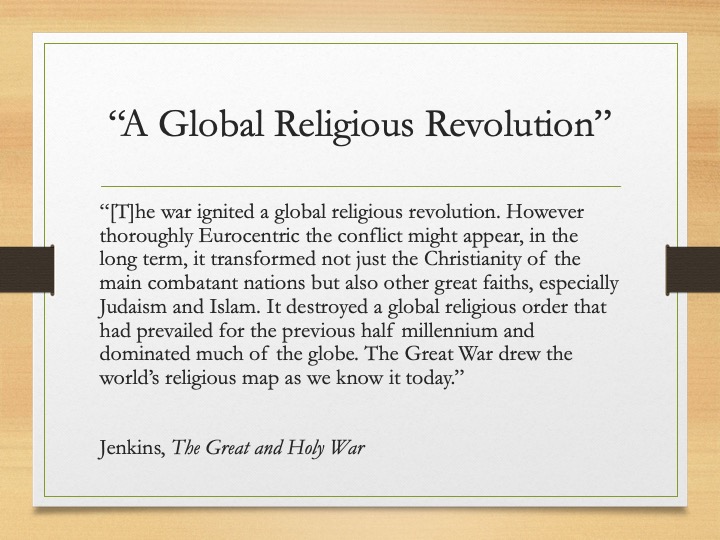
“A Global Religious Revolution”
“The war (WWI) ignited a global religious revolution. However thoroughly Eurocentric the conflict might appear, in the long term, it transformed not just the Christianity of the main combatant nations but also other great faiths, especially Judaism and Islam. It destroyed a global religious order that had prevailed for the previous half millennium and dominated much of the globe. The Great War (WWI) drew the world’s religious map as we know it today.”
Jenkins, The Great and Holy War
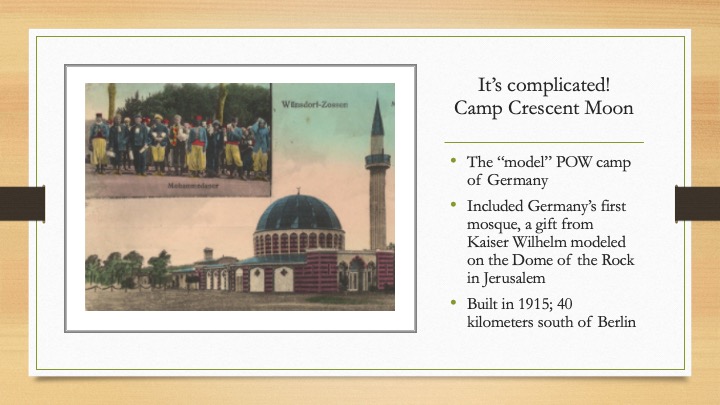
It’s complicated! Camp Crescent Moon
The “model” POW camp of Germany
Included Germany’s first mosque, a gift from Kaiser Wilhelm modeled on the Dome of the Rock in Jerusalem
Built in 1915; 40 kilometers south of Berlin
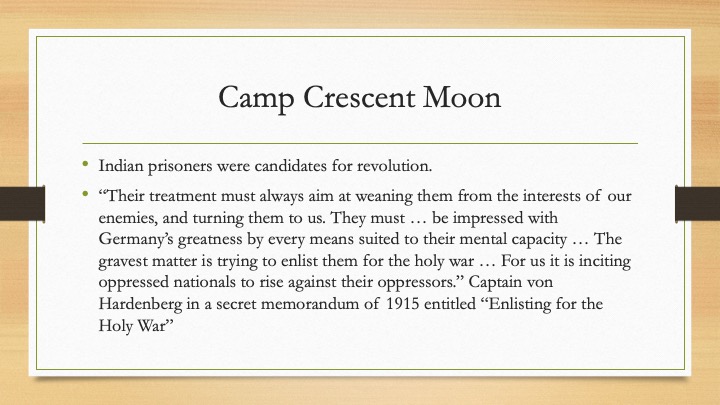
Camp Crescent Moon
Indian prisoners were candidates for revolution.
“Their treatment must always aim at weaning them from the interests of our enemies, and turning them to us. They must … be impressed with Germany’s greatness by every means suited to their mental capacity … The gravest matter is trying to enlist them for the holy war … For us it is inciting oppressed nationals to rise against their oppressors.” Captain von Hardenberg in a secret memorandum of 1915 entitled “Enlisting for the Holy War”
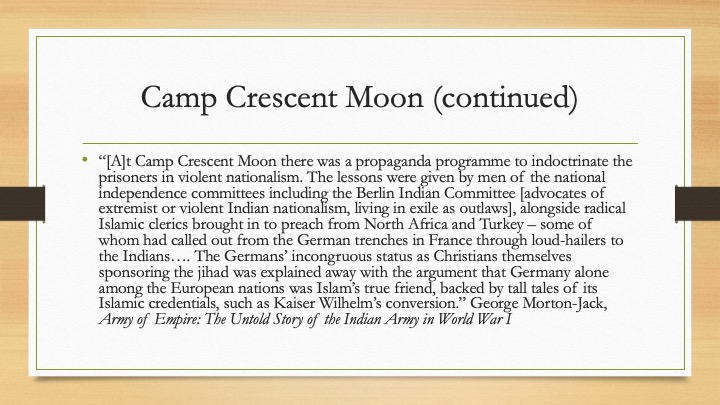
Camp Crescent Moon (continued)
“[A]t Camp Crescent Moon there was a propaganda program to indoctrinate the prisoners in violent nationalism. The lessons were given by men of the national independence committees including the Berlin Indian Committee [advocates of extremist or violent Indian nationalism, living in exile as outlaws], alongside radical Islamic clerics brought in to preach from North Africa and Turkey – some of whom had called out from the German trenches in France through loud-hailers to the Indians…. The Germans’ incongruous status as Christians themselves sponsoring the jihad was explained away with the argument that Germany alone among the European nations was Islam’s true friend, backed by tall tales of its Islamic credentials, such as Kaiser Wilhelm’s conversion.” George Morton-Jack, Army of Empire: The Untold Story of the Indian Army in World War I
Religion In WWI
II. “Are you for us or our adversaries?”
The Commander of the Lord's Army: Joshua 5:13-15
13 When Joshua was by Jericho, he lifted up his eyes and looked, and behold, a man was standing before him with his drawn sword in his hand. And Joshua went to him and said to him, “Are you for us, or for our adversaries?” 14 And he said, “No; but I am the commander of the army of the Lord. Now I have come.” And Joshua fell on his face to the earth and worshiped and said to him, “What does my lord say to his servant?” 15 And the commander of the Lord's army said to Joshua, “Take off your sandals from your feet, for the place where you are standing is holy.” And Joshua did so.
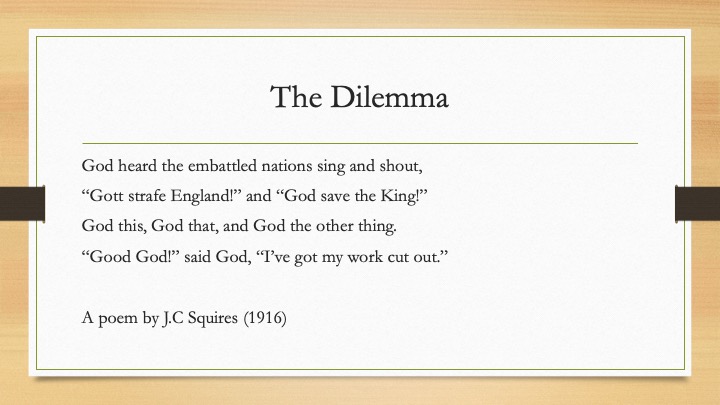
The Dilemma
God heard the embattled nations sing and shout,
“Gott strafe England!” and “God save the King!”
God this, God that, and God the other thing.
“Good God!” said God, “I’ve got my work cut out.”
A poem by J.C Squires (1916)
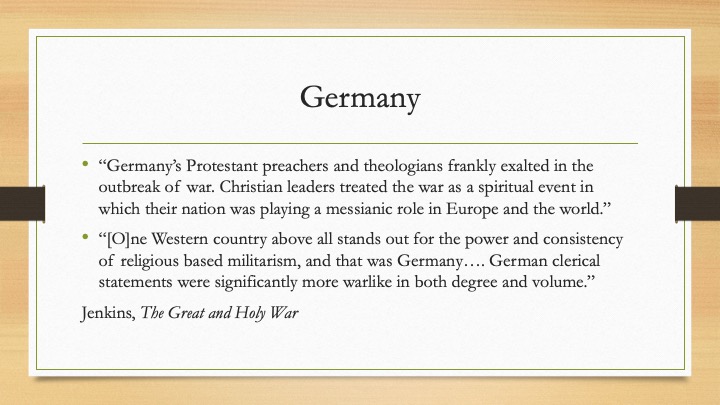
Germany
“Germany’s Protestant preachers and theologians frankly exalted in the outbreak of WWI. Christian leaders treated the war as a spiritual event in which their nation was playing a messianic role in Europe and the world.”
“One Western country above all stands out for the power and consistency of religious based militarism, and that was Germany…. German clerical statements were significantly more warlike in both degree and volume.”
Jenkins, The Great and Holy War
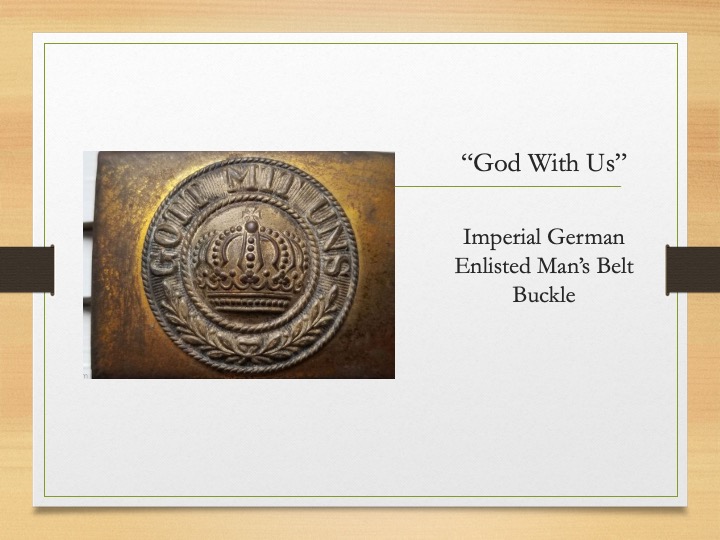
God With Us
Every imperial German enlisted man's belt buckle in WWI stated clearly "Gott Mit Uns" - "God With US".

The Lord’s Prayer ?
Our Father, from the height of heaven, Make haste to succor Thy German people.
Help us in the holy war,
Let your name, like a star guide us:
Lead Thy German Reich to glorious victories.
Who will stand before the conquerors?
Who will go into the dark sword-grave?
Lord, Thy will be done!

The Lord’s Prayer? (cont.)
Although war’s bread be scanty,
Smite the foe each day
With death and tenfold woes.
In Thy merciful patience, forgive
Each bullet and each blow
That misses its mark.
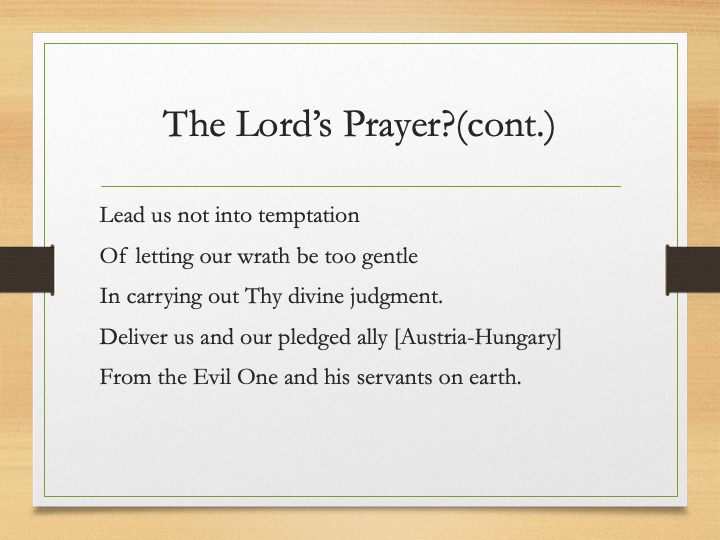
The Lord’s Prayer?(cont.)
Lead us not into temptation
Of letting our wrath be too gentle
In carrying out Thy divine judgment.
Deliver us and our pledged ally [Austria-Hungary]
From the Evil One and his servants on earth.
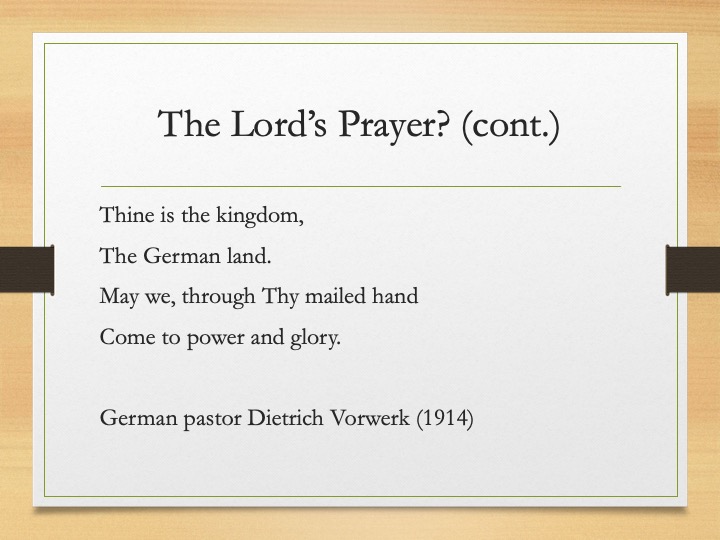
The Lord’s Prayer? (cont.)
Thine is the kingdom,
The German land.
May we, through Thy mailed hand
Come to power and glory.
German pastor Dietrich Vorwerk (1914)
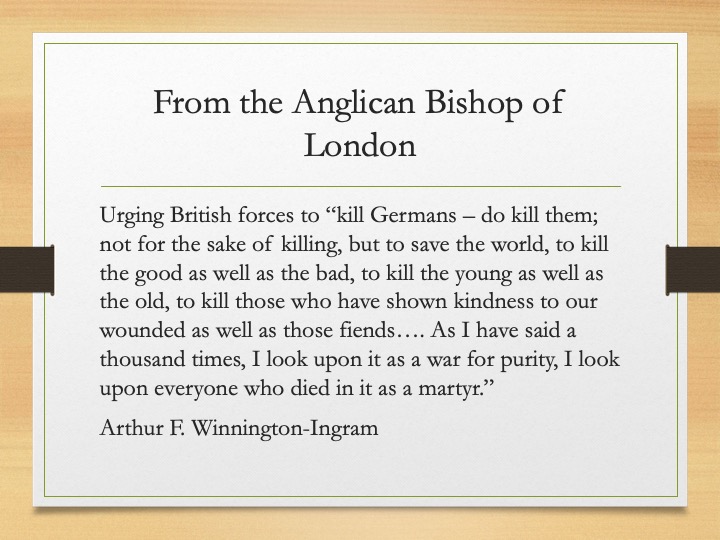
From the Anglican Bishop of London
Urging British forces to “kill Germans – do kill them; not for the sake of killing, but to save the world, to kill the good as well as the bad, to kill the young as well as the old, to kill those who have shown kindness to our wounded as well as those fiends…. As I have said a thousand times, I look upon it as a war for purity, I look upon everyone who died in it as a martyr.”
Arthur F. Winnington-Ingram
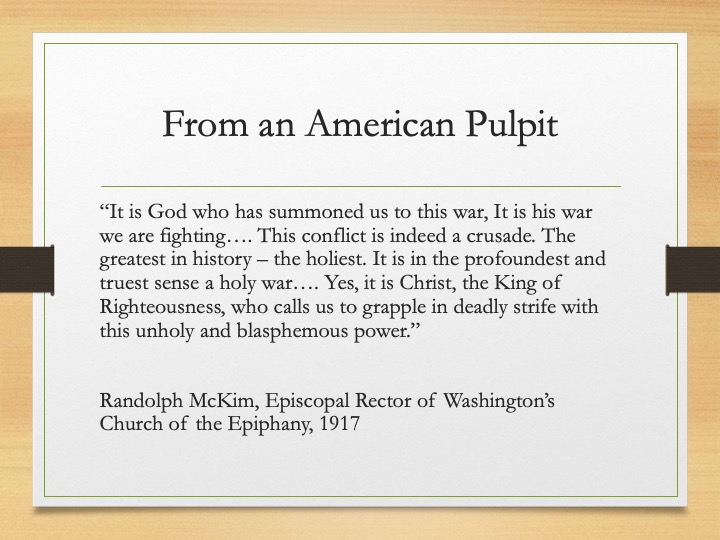
From an American Pulpit
“It is God who has summoned us to this war, It is his war we are fighting…. This conflict is indeed a crusade. The greatest in history – the holiest. It is in the profoundest and truest sense a holy war…. Yes, it is Christ, the King of Righteousness, who calls us to grapple in deadly strife with this unholy and blasphemous power.”
Randolph McKim, Episcopal Rector of Washington’s Church of the Epiphany, 1917
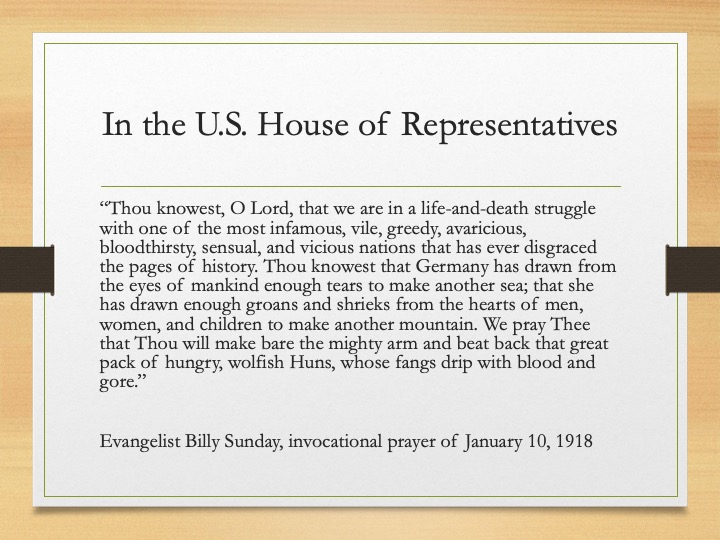
In the U.S. House of Representatives
“Thou knowest, O Lord, that we are in a life-and-death struggle with one of the most infamous, vile, greedy, avaricious, bloodthirsty, sensual, and vicious nations that has ever disgraced the pages of history. Thou knowest that Germany has drawn from the eyes of mankind enough tears to make another sea; that she has drawn enough groans and shrieks from the hearts of men, women, and children to make another mountain. We pray Thee that Thou will make bare the mighty arm and beat back that great pack of hungry, wolfish Huns, whose fangs drip with blood and gore.”
Evangelist Billy Sunday, invocational prayer of January 10, 1918
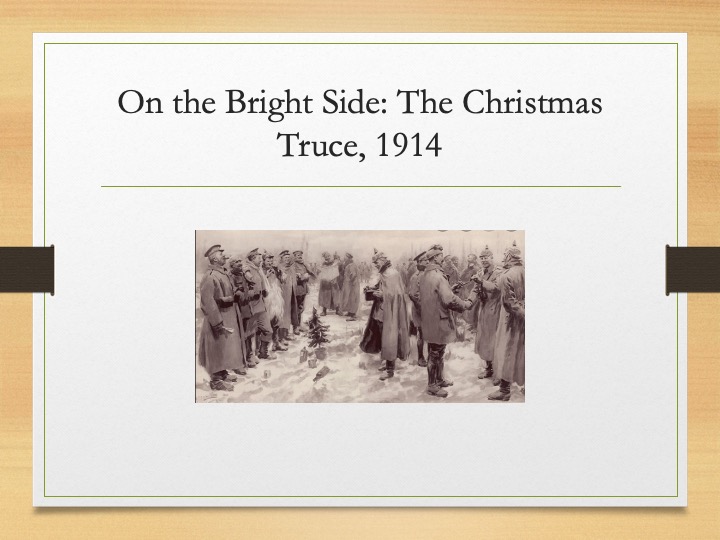
On the Bright Side: The Christmas Truce, 1914
Yes – there was a bright side. At Christmas time in WWI in 1914 the soldiers came out of their trench's and exchanged Christmas gifts. But their leaders put an end to that after they found out about it.
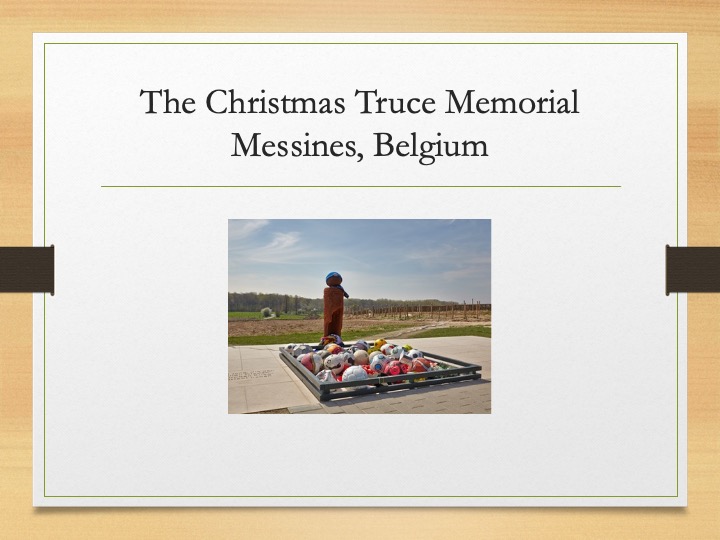
The Christmas Truce
Memorial
Messines, Belgium
And there is a memorial to that Christmas
Truce today in Belgium. The memorial contains a collection of soccer football
balls that the two groups of warring soldiers used for some quick playing
before they went back to their trenches to continue the killing.
Religion In WWI
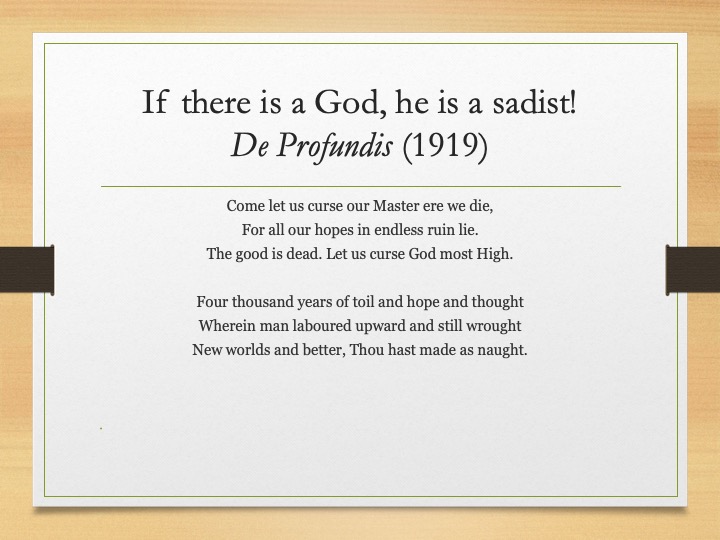
If there is a God, he is a sadist!
De
Profundis (1919)
Come let us curse our Master ere we die,
For all our hopes in endless ruin lie.
The good is dead. Let us curse God most High.
Four thousand years of toil and hope and thought
Wherein man laboured upward and still wrought
New worlds and better, Thou hast made as naught.
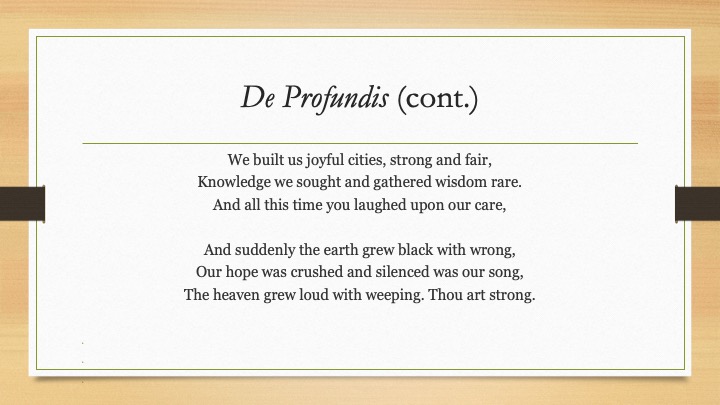
De Profundis (cont.)
We built us joyful cities, strong and fair,
Knowledge we sought and gathered wisdom rare.
And all this time you laughed upon our care,
And suddenly the earth grew black with wrong,
Our hope was crushed and silenced was our song,
The heaven grew loud with weeping. Thou art strong.
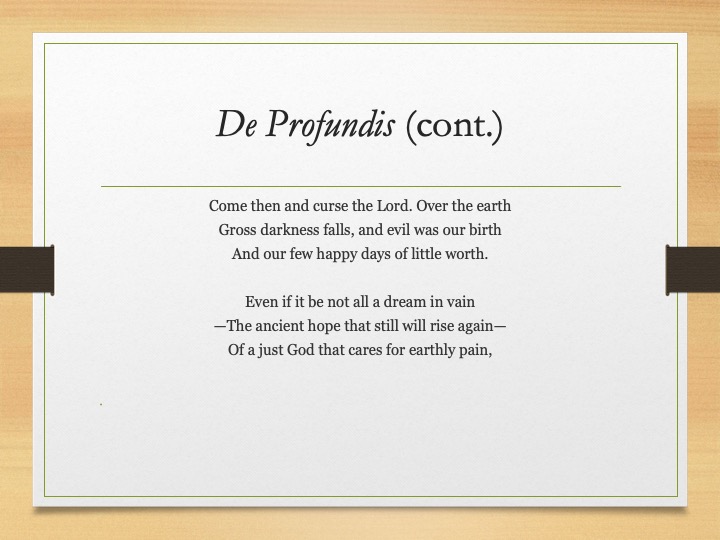
De Profundis (cont.)
Come then and curse the Lord. Over the earth
Gross darkness falls, and evil was our birth
And our few happy days of little worth.
Even if it be not all a dream in vain
—The ancient hope that still will rise again—
Of a just God that cares for earthly pain,
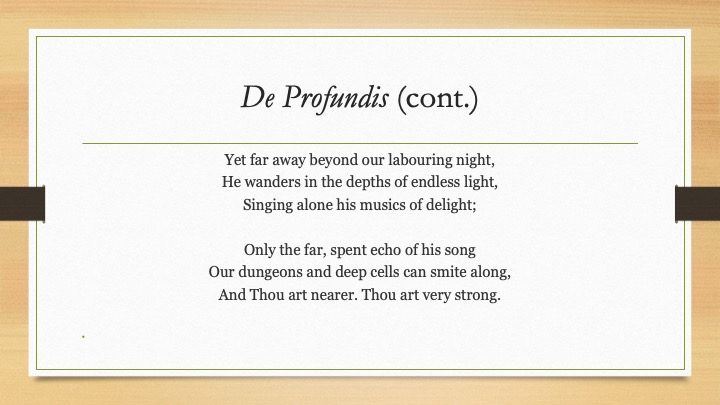
De Profundis (cont.)
Yet far away beyond our labouring night,
He wanders in the depths of endless light,
Singing alone his musics of delight;
Only the far, spent echo of his song
Our dungeons and deep cells can smite along,
And Thou art nearer. Thou art very strong.
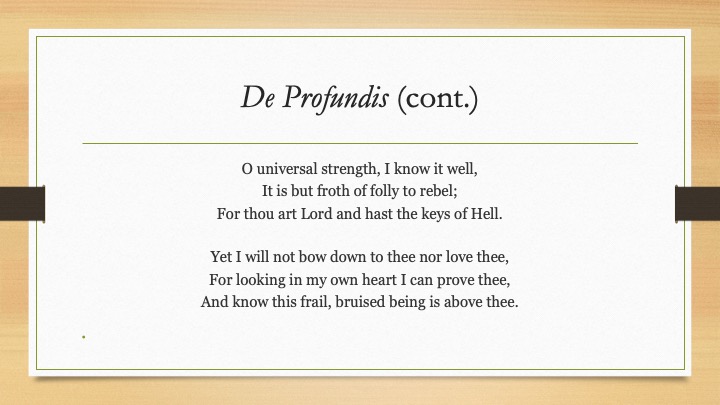
De Profundis (cont.)
O universal strength, I know it well,
It is but froth of folly to rebel;
For thou art Lord and hast the keys of Hell.
Yet I will not bow down to thee nor love thee,
For looking in my own heart I can prove thee,
And know this frail, bruised being is above thee.
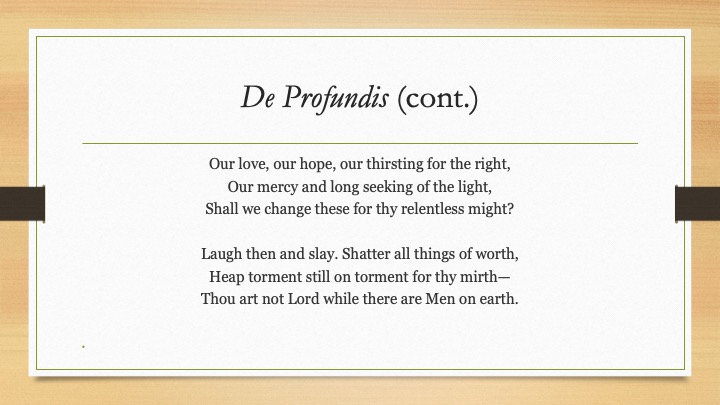
De Profundis (cont.)
Our love, our hope, our thirsting for the right,
Our mercy and long seeking of the light,
Shall we change these for thy relentless might?
Laugh then and slay. Shatter all things of worth,
Heap torment still on torment for thy mirth—
Thou art not Lord while there are Men on earth
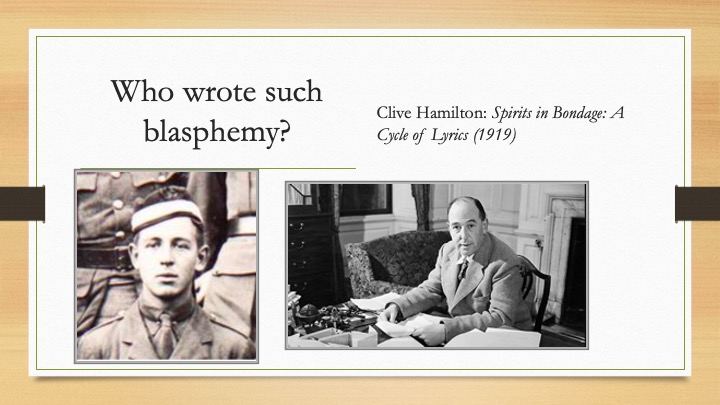
Who Wrote Such Blasphemy?
Clive Hamilton is actually a pseudonym. This is C. S. Lewis. In 1919 Lewis published his first book, a cycle of lyrics captioned "Spirits in Bondage", which he wrote under the pseudonym Clive Hamilton. This was 12 years before he turned to Christianity.
Religion in WWI
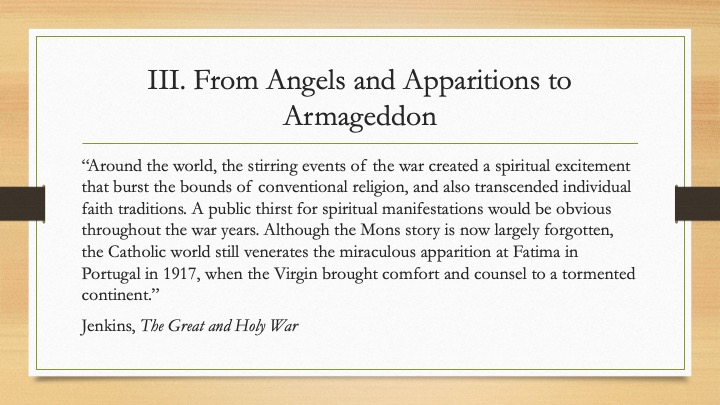
III. From Angels and Apparitions to Armageddon
“Around the world, the stirring events of WWI created a spiritual excitement that burst the bounds of conventional religion, and also transcended individual faith traditions. A public thirst for spiritual manifestations would be obvious throughout the war years. Although the Mons story is now largely forgotten, the Catholic world still venerates the miraculous apparition at Fatima in Portugal in 1917, when the Virgin brought comfort and counsel to a tormented continent.”
Jenkins, The Great and Holy War
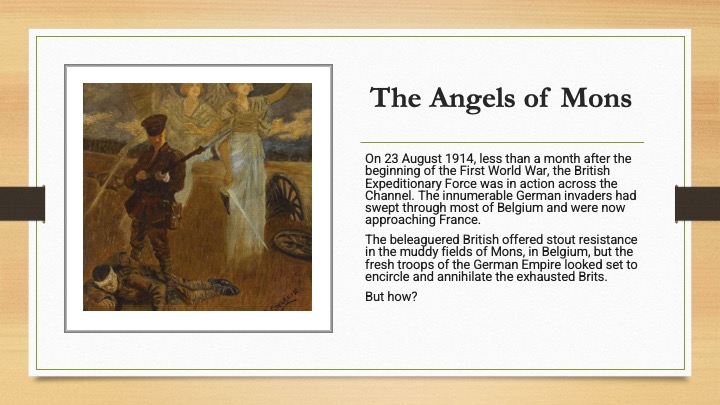
The Angels of Mons
On 23 August 1914, less than a month after the beginning of the First World War, the British Expeditionary Force was in action across the Channel. The innumerable German invaders had swept through most of Belgium and were now approaching France.
The beleaguered British offered stout resistance in the muddy fields of Mons, in Belgium, but the fresh troops of the German Empire looked set to encircle and annihilate the exhausted Brits.
But how?
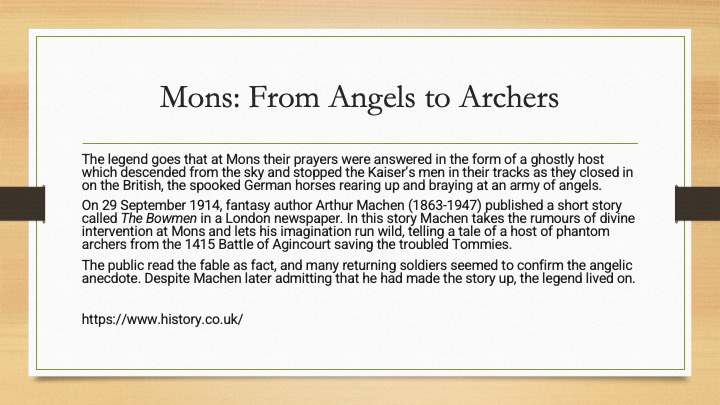
Mons: From Angels to Archers
The legend goes that at Mons their prayers were answered in the form of a ghostly host which descended from the sky and stopped the Kaiser’s men in their tracks as they closed in on the British, the spooked German horses rearing up and braying at an army of angels.
On 29 September 1914, fantasy author Arthur Machen (1863-1947) published a short story called The Bowmen in a London newspaper. In this story Machen takes the rumors of divine intervention at Mons and lets his imagination run wild, telling a tale of a host of phantom archers from the 1415 Battle of Agincourt saving the troubled Tommies.
The public read the fable as fact, and many returning soldiers seemed to confirm the angelic anecdote. Despite Machen later admitting that he had made the story up, the legend lived on.
https://www.history.co.uk/
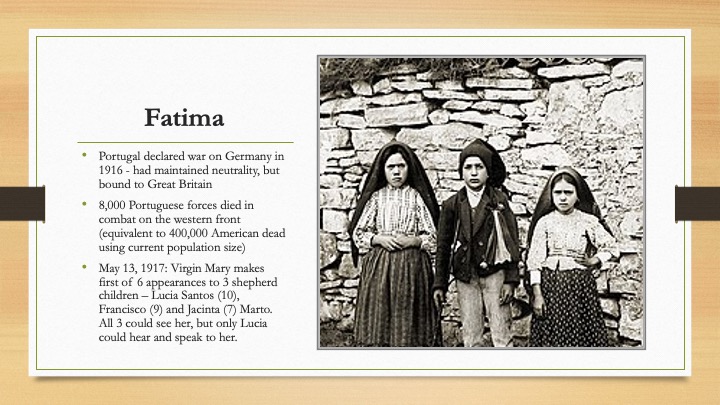
Fatima
Portugal declared war on Germany in 1916 - had maintained neutrality, but bound to Great Britain
8,000 Portuguese forces died in combat on the western front (equivalent to 400,000 American dead using current population size)
May 13, 1917: Virgin Mary makes first of 6 appearances to 3 shepherd children – Lucia Santos (10), Francisco (9) and Jacinta (7) Marto. All 3 could see her, but only Lucia could hear and speak to her.
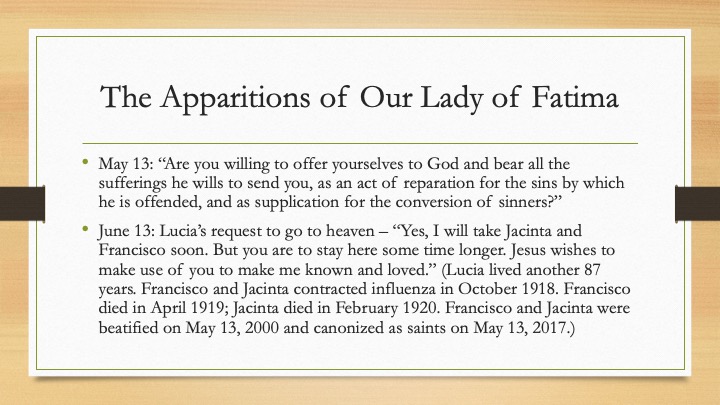
The Apparitions of Our Lady of Fatima
May 13: “Are you willing to offer yourselves to God and bear all the sufferings he wills to send you, as an act of reparation for the sins by which he is offended, and as supplication for the conversion of sinners?”
June 13: Lucia’s request to go to heaven – “Yes, I will take Jacinta and Francisco soon. But you are to stay here some time longer. Jesus wishes to make use of you to make me known and loved.” (Lucia lived another 87 years. Francisco and Jacinta contracted influenza in October 1918. Francisco died in April 1919; Jacinta died in February 1920. Francisco and Jacinta were beatified on May 13, 2000 and canonized as saints on May 13, 2017.)
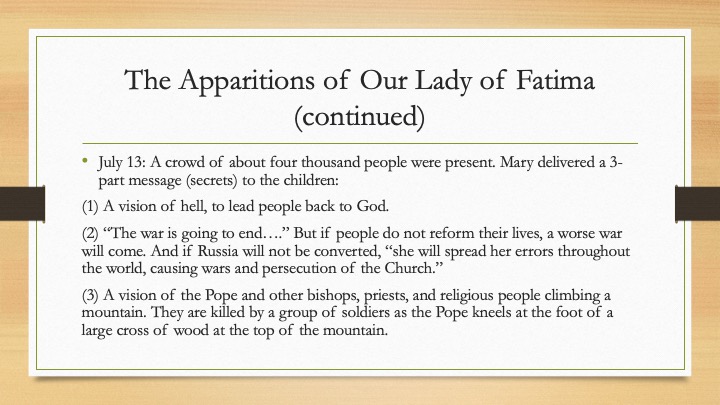
The Apparitions of Our Lady of Fatima (continued)
July 13: A crowd of about four thousand people were present. Mary delivered a 3-part message (secrets) to the children:
(1) A vision of hell, to lead people back to God.
(2) “The war is going to end….” But if people do not reform their lives, a worse war will come. And if Russia will not be converted, “she will spread her errors throughout the world, causing wars and persecution of the Church.”
(3) A vision of the Pope and other bishops, priests, and religious people climbing a mountain. They are killed by a group of soldiers as the Pope kneels at the foot of a large cross of wood at the top of the mountain.
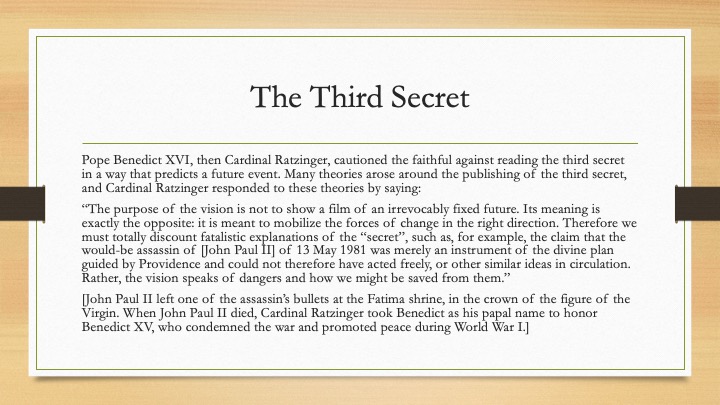
The Third Secret
Pope Benedict XVI, then Cardinal Ratzinger, cautioned the faithful against reading the third secret in a way that predicts a future event. Many theories arose around the publishing of the third secret, and Cardinal Ratzinger responded to these theories by saying:
“The purpose of the vision is not to show a film of an irrevocably fixed future. Its meaning is exactly the opposite: it is meant to mobilize the forces of change in the right direction. Therefore we must totally discount fatalistic explanations of the “secret”, such as, for example, the claim that the would-be assassin of [John Paul II] of 13 May 1981 was merely an instrument of the divine plan guided by Providence and could not therefore have acted freely, or other similar ideas in circulation. Rather, the vision speaks of dangers and how we might be saved from them.”
[John Paul II left one of the assassin’s bullets at the Fatima shrine, in the crown of the figure of the Virgin. When John Paul II died, Cardinal Ratzinger took Benedict as his papal name to honor Benedict XV, who condemned the war and promoted peace during World War I.]
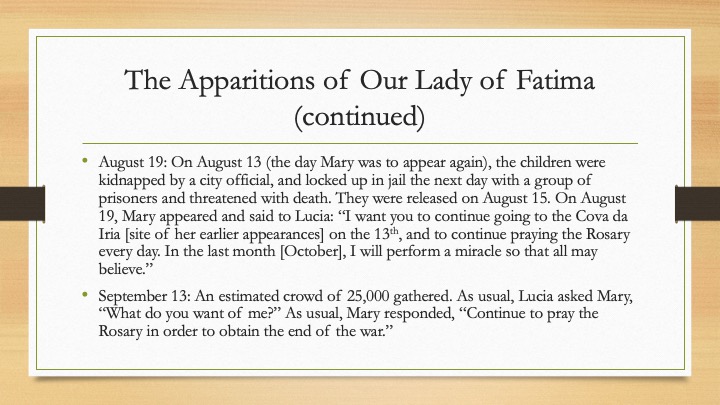
The Apparitions of Our Lady of Fatima (continued)
August 19: On August 13 (the day Mary was to appear again), the children were kidnapped by a city official, and locked up in jail the next day with a group of prisoners and threatened with death. They were released on August 15. On August 19, Mary appeared and said to Lucia: “I want you to continue going to the Cova da Iria [site of her earlier appearances] on the 13th, and to continue praying the Rosary every day. In the last month [October], I will perform a miracle so that all may believe.”
September 13: An estimated crowd of 25,000 gathered. As usual, Lucia asked Mary, “What do you want of me?” As usual, Mary responded, “Continue to pray the Rosary in order to obtain the end of the war.”
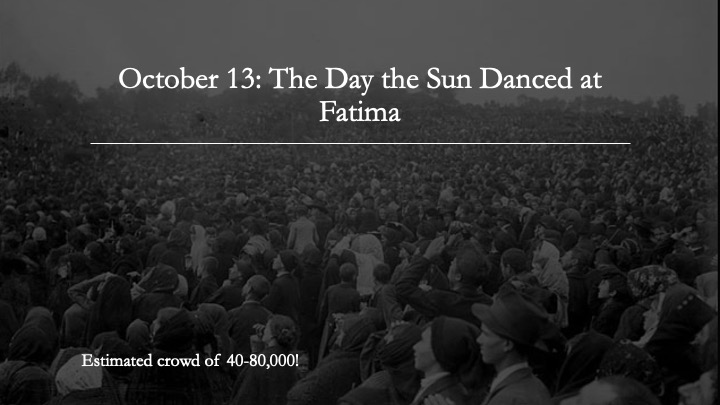
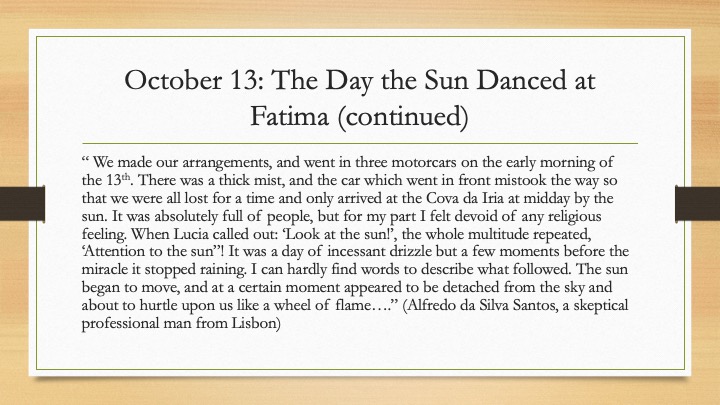
October 13: The Day the Sun Danced at Fatima (continued)
“ We made our arrangements, and went in three motorcars on the early morning of the 13th. There was a thick mist, and the car which went in front mistook the way so that we were all lost for a time and only arrived at the Cova da Iria at midday by the sun. It was absolutely full of people, but for my part I felt devoid of any religious feeling. When Lucia called out: ‘Look at the sun!’, the whole multitude repeated, ‘Attention to the sun”! It was a day of incessant drizzle but a few moments before the miracle it stopped raining. I can hardly find words to describe what followed. The sun began to move, and at a certain moment appeared to be detached from the sky and about to hurtle upon us like a wheel of flame….” (Alfredo da Silva Santos, a skeptical professional man from Lisbon)
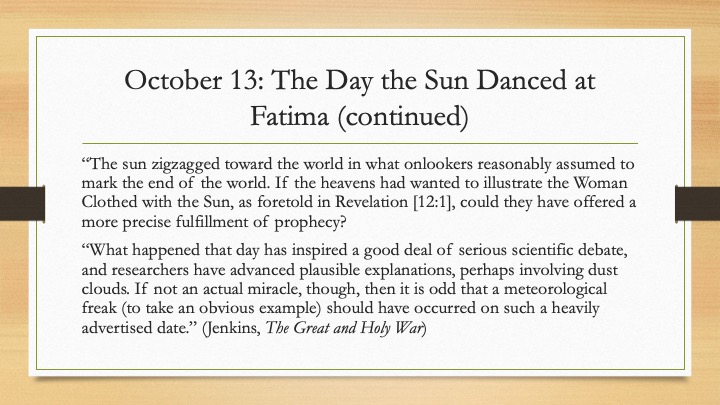
October 13: The Day the Sun Danced at Fatima (continued)
“The sun zigzagged toward the world in what onlookers reasonably assumed to mark the end of the world. If the heavens had wanted to illustrate the Woman Clothed with the Sun, as foretold in Revelation [12:1], could they have offered a more precise fulfillment of prophecy?
“What happened that day has inspired a good deal of serious scientific debate, and researchers have advanced plausible explanations, perhaps involving dust clouds. If not an actual miracle, though, then it is odd that a meteorological freak (to take an obvious example) should have occurred on such a heavily advertised date.” (Jenkins, The Great and Holy War)
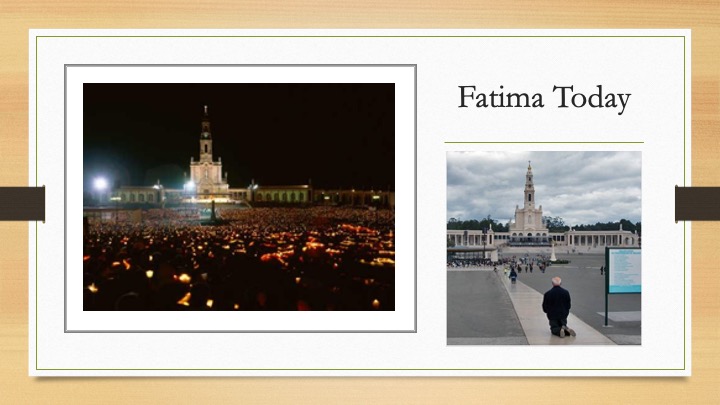
Religion In WWI
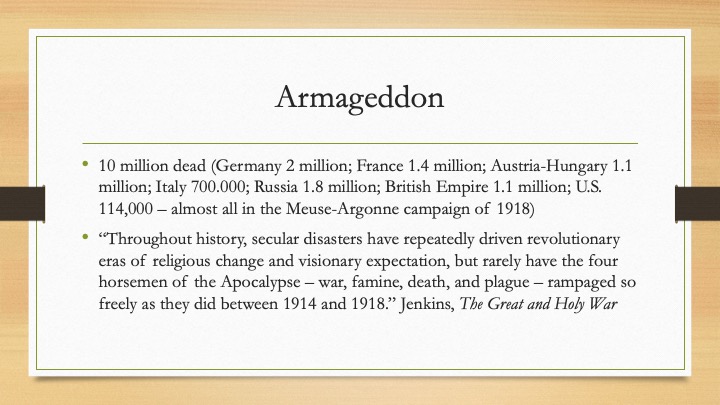
Armageddon
10 million dead (Germany 2 million; France 1.4 million; Austria-Hungary 1.1 million; Italy 700.000; Russia 1.8 million; British Empire 1.1 million; U.S. 114,000 – almost all in the Meuse-Argonne campaign of 1918)
“Throughout history, secular disasters have repeatedly driven revolutionary eras of religious change and visionary expectation, but rarely have the four horsemen of the Apocalypse – war, famine, death, and plague – rampaged so freely as they did between 1914 and 1918.” Jenkins, The Great and Holy War
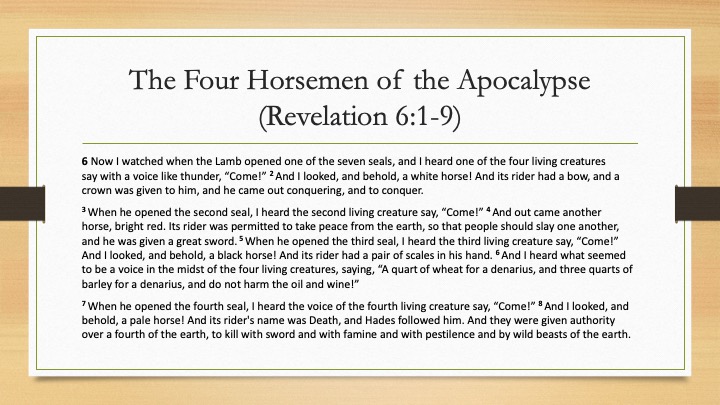
The Four Horsemen of the Apocalypse (Revelation 6:1-9)
6 Now I watched when the Lamb opened one of the seven seals, and I heard one of the four living creatures say with a voice like thunder, “Come!” 2 And I looked, and behold, a white horse! And its rider had a bow, and a crown was given to him, and he came out conquering, and to conquer.
3 When he opened the second seal, I heard the second living creature say, “Come!” 4 And out came another horse, bright red. Its rider was permitted to take peace from the earth, so that people should slay one another, and he was given a great sword. 5 When he opened the third seal, I heard the third living creature say, “Come!” And I looked, and behold, a black horse! And its rider had a pair of scales in his hand. 6 And I heard what seemed to be a voice in the midst of the four living creatures, saying, “A quart of wheat for a denarius, and three quarts of barley for a denarius, and do not harm the oil and wine!”
7 When he opened the fourth seal, I heard the voice of the fourth living creature say, “Come!” 8 And I looked, and behold, a pale horse! And its rider's name was Death, and Hades followed him. And they were given authority over a fourth of the earth, to kill with sword and with famine and with pestilence and by wild beasts of the earth.
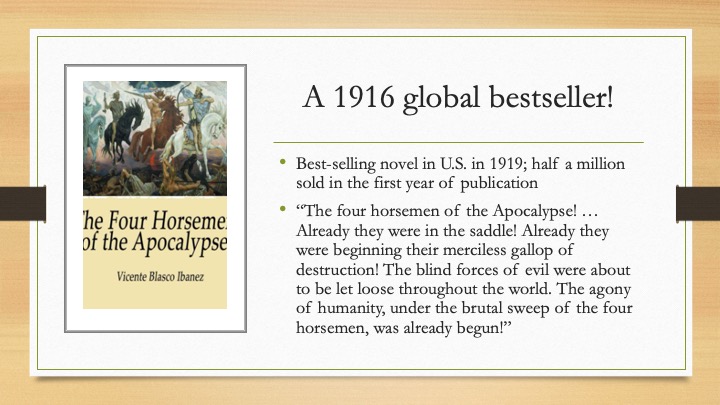
A 1916 global bestseller!
Best-selling novel in U.S. in 1919; half a million sold in the first year of publication
“The four horsemen of the Apocalypse! … Already they were in the saddle! Already they were beginning their merciless gallop of destruction! The blind forces of evil were about to be let loose throughout the world. The agony of humanity, under the brutal sweep of the four horsemen, was already begun!”

The bestseller becomes a blockbuster movie!
1921 silent movie version made Rudolph Valentino a star
First film to gross over $1,000,000 (earned $4,000,000)
Sixth-highest grossing silent film ever
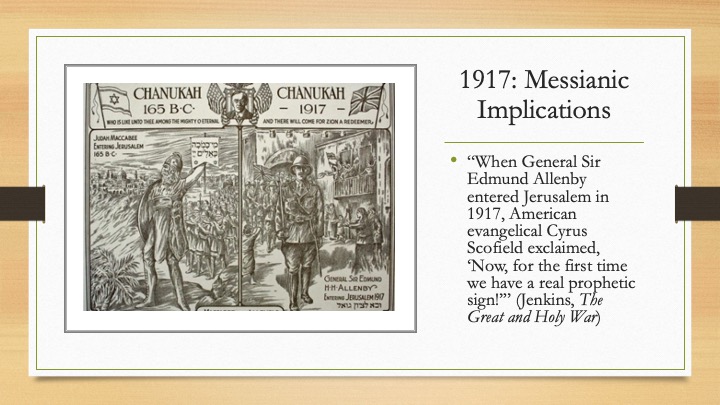
1917: Messianic Implications
“When General Sir Edmund Allenby entered Jerusalem in 1917, American evangelical Cyrus Scofield exclaimed, ‘Now, for the first time we have a real prophetic sign!’” (Jenkins, The Great and Holy War)
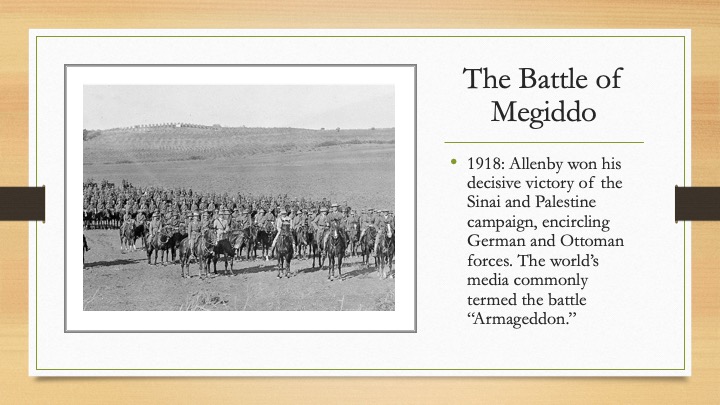
The Battle of Megiddo
1918: Allenby won his decisive victory of the Sinai and Palestine campaign in WWI, encircling German and Ottoman forces. The world’s media commonly termed the battle “Armageddon.”